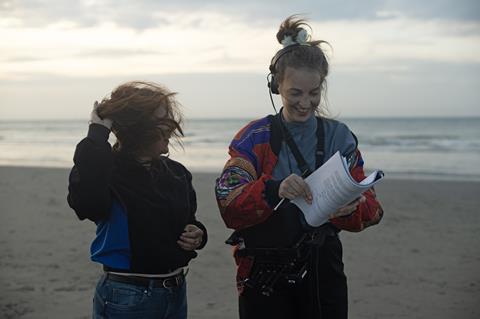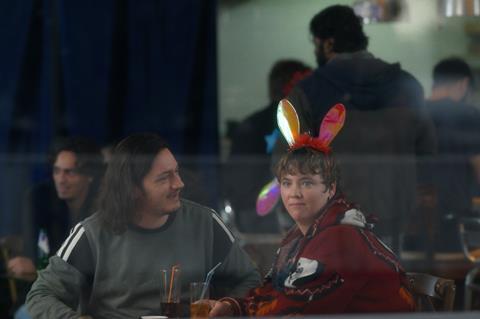
“I couldn’t believe the job I was doing didn’t exist already,” says Margault Algudo-Brzostek, France’s first ‘accessibility coordination manager’, on Venice premiere My Everything and French summer hit A Little Something Extra, which both star several actors with disabilities.
Algudo-Brzostek’s role was to work with those actors and act as a go-between with the crew to facilitate the filming process.
My Everything stars Laure Calamy as a single mother who discovers her adult son Joel, who has intellectual disabilities, has impregnated his co-worker Océane who is also disabled. According to French first-time director Anne-Sophie Bailly, the film is not a social drama about the challenges they face but instead focuses on a mother’s bond with her son and her own developing romance.
The film arrives in the Horizons sidebar at Venice at the end of a summer in which A Little Something Extra has become a box-office phenomenon in France. With 10 million admissions and counting, it is the country’s most successful local film for a decade. The father-son comedy directed by and starring Artus features an ensemble cast of actors with real-life disabilities.
Similarly, My Everything’s Océane and Joël are played by professional actor Charles Peccia Galletto and first-timer Julie Froger.
One of Algudo-Brzostek’s duties as accessibility coordination manager was to rewrite the nightly call sheets for Froger in pictograms so the actress could more easily understand, and coordinate with hair and make-up since Froger is sensitive to touch.
For an intimate scene between Froger and Peccia Galletto, Algudo-Brzostek worked with intimacy coordinator Monia Aït El Hadj, director Bailly and the actors for what she describes as “an orchestra. We created a symphony together. It was choreographed and very fluid.”
Froger is sensitive to noise, so Algudo-Brzostek took strides to make sure it was ‘quiet on the set’ when shooting that key scene.
“The crew wanted to make her feel comfortable but told me it couldn’t work from a technical perspective. I said,‘Let’s try it’.”
Sound was kept to a minimum when cameras rolled, and in between takes, Algudo-Brzostek gave Froger noise-cancelling headphones. The experiment worked. “We achieved Olympic-level calm and quiet. It was extraordinary,” recalls Bailly.
Algudo-Brzostek adds: “When we wrapped, everyone said it was the most relaxed and productive day they’d had on a film set.”
The film’s producer, David Thion of Les Films Pélleas, says that despite the adjustments, it was business as usual in all stages of production. “We developed the script like any other,” he says, describing Algudo-Brzostek’s role in the film as “key and essential”.
Bailly planned by asking for extra shooting days ahead of time. “You can’t stretch someone past their limits in general, but it is even more true for actors with physical or emotional limitations,” she explains. “We had to adapt to them, even if that wasn’t perfectly aligned with the schedule.”
Thion, whose credits include Anatomy Of A Fall, explains: “I was sure we’d have to clock overtime, but to our surprise, we hardly surpassed working hours.”
Shining a light

Bailly, a graduate of Paris’ prestigious film school La Fémis, comes from a family of caregivers and says her motivation for the film came from joining her mother at the retirement home where she worked and meeting an 80-year-old woman and her 60-year-old daughter who had spent their lives living together due to the daughter’s intellectual disability.
“The link between parent and child was so strong and radical and the co-dependence it created stayed with me,” she explains.
“I didn’t want to make inspirational porn,” she adds. “I didn’t want to show disabled characters who face difficult situations and then emerge victorious in the end. This is a film about emancipation, about characters with disabilities living the lives they choose despite society’s imposed stigmas.
“Disabled people make up a large part of the population, but they are often hidden and we don’t consider them to be our co-citizens. We find it hard to talk to them or about them. I want to help to bring them out of the shadows.”
Les Films du Losange is distributing My Everything in France in December. It plans to work with the appropriate associations to organise targeted screenings, but is aiming for a wide release and to achieve broad appeal.
“Distributors now have more confidence in films like My Everything that they know can appeal to their local audiences,” says Jean-Benoit Henry, head of sales at Les films du Losange.
Thion believes the film can work well on wide release. “My Everything is a positive, optimistic vision of disability that is also realistic and far from utopian,” he says. “The film highlights characters with disabilities who just want to live like everyone else.”
Pioneer
After months of work to define the position, the job of ‘coordinateur régie handicap’ will soon be an official role on French film sets. Additionally, France’s CNC has been spearheading reforms to support projects centred around disabilities including a €300,000 fund launched three years ago with the Agefiph, a French association that works to find employment for people with disabilities. Seventeen projects have been approved in 2024 including several feature films whose main characters have disabilities.
Algudo-Brzostek hopes to train more accessibility coordination managers and has been creating a ‘how-to’ guide for use in both France and around the world.
She looked around the world for inspiration but realised she was a pioneer. “I was optimistic and hoped to find similar crew roles in other countries,” she says. “But I haven’t found any.”
My Everything is screening in the Horizons competition at Venice film festival today (August 31).
























No comments yet